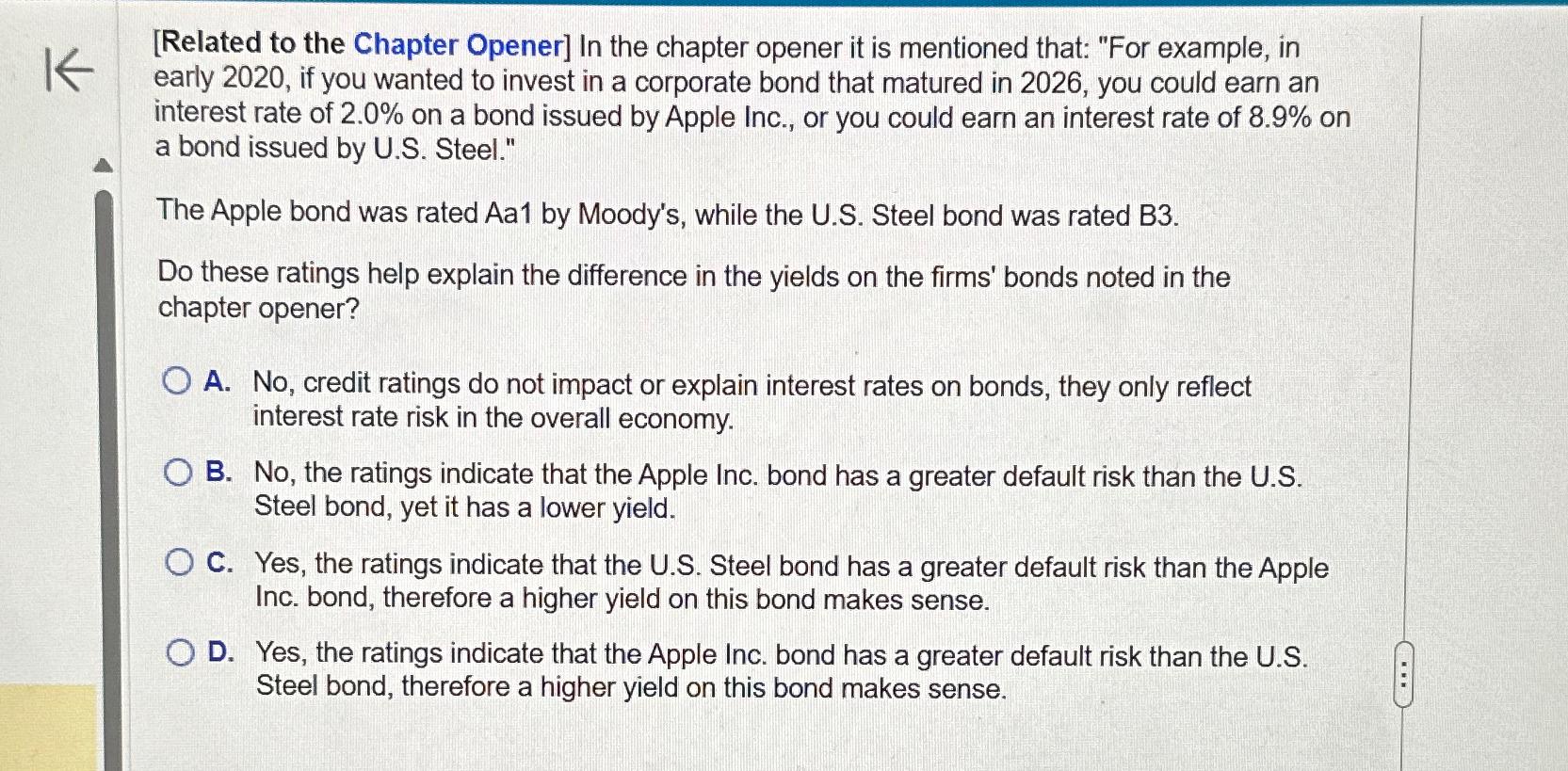Question
[Related to the Chapter Opener] In the chapter opener it is mentioned that: For example, in early 2020 , if you wanted to invest in
[Related to the Chapter Opener] In the chapter opener it is mentioned that: "For example, in early 2020 , if you wanted to invest in a corporate bond that matured in 2026 , you could earn an interest rate of
2.0% on a bond issued by Apple Inc., or you could earn an interest rate of
8.9% on a bond issued by U.S. Steel."\ The Apple bond was rated Aa1 by Moody's, while the U.S. Steel bond was rated B3.\ Do these ratings help explain the difference in the yields on the firms' bonds noted in the chapter opener?\ A. No, credit ratings do not impact or explain interest rates on bonds, they only reflect interest rate risk in the overall economy.\ B. No, the ratings indicate that the Apple Inc. bond has a greater default risk than the U.S. Steel bond, yet it has a lower yield.\ C. Yes, the ratings indicate that the U.S. Steel bond has a greater default risk than the Apple Inc. bond, therefore a higher yield on this bond makes sense.\ D. Yes, the ratings indicate that the Apple Inc. bond has a greater default risk than the U.S. Steel bond, therefore a higher yield on this bond makes sense.
 [Related to the Chapter Opener] In the chapter opener it is mentioned that: "For example, in early 2020 , if you wanted to invest in a corporate bond that matured in 2026 , you could earn an interest rate of 2.0% on a bond issued by Apple Inc., or you could earn an interest rate of 8.9% on a bond issued by U.S. Steel." The Apple bond was rated Aa1 by Moody's, while the U.S. Steel bond was rated B3. Do these ratings help explain the difference in the yields on the firms' bonds noted in the chapter opener? A. No, credit ratings do not impact or explain interest rates on bonds, they only reflect interest rate risk in the overall economy. B. No, the ratings indicate that the Apple Inc. bond has a greater default risk than the U.S. Steel bond, yet it has a lower yield. C. Yes, the ratings indicate that the U.S. Steel bond has a greater default risk than the Apple Inc. bond, therefore a higher yield on this bond makes sense. D. Yes, the ratings indicate that the Apple Inc. bond has a greater default risk than the U.S. Steel bond, therefore a higher yield on this bond makes sense
[Related to the Chapter Opener] In the chapter opener it is mentioned that: "For example, in early 2020 , if you wanted to invest in a corporate bond that matured in 2026 , you could earn an interest rate of 2.0% on a bond issued by Apple Inc., or you could earn an interest rate of 8.9% on a bond issued by U.S. Steel." The Apple bond was rated Aa1 by Moody's, while the U.S. Steel bond was rated B3. Do these ratings help explain the difference in the yields on the firms' bonds noted in the chapter opener? A. No, credit ratings do not impact or explain interest rates on bonds, they only reflect interest rate risk in the overall economy. B. No, the ratings indicate that the Apple Inc. bond has a greater default risk than the U.S. Steel bond, yet it has a lower yield. C. Yes, the ratings indicate that the U.S. Steel bond has a greater default risk than the Apple Inc. bond, therefore a higher yield on this bond makes sense. D. Yes, the ratings indicate that the Apple Inc. bond has a greater default risk than the U.S. Steel bond, therefore a higher yield on this bond makes sense
[Related to the Chapter Opener] In the chapter opener it is mentioned that: "For example, in early 2020 , if you wanted to invest in a corporate bond that matured in 2026 , you could earn an interest rate of
2.0%on a bond issued by Apple Inc., or you could earn an interest rate of
8.9%on a bond issued by U.S. Steel."\ The Apple bond was rated Aa1 by Moody's, while the U.S. Steel bond was rated B3.\ Do these ratings help explain the difference in the yields on the firms' bonds noted in the chapter opener?\ A. No, credit ratings do not impact or explain interest rates on bonds, they only reflect interest rate risk in the overall economy.\ B. No, the ratings indicate that the Apple Inc. bond has a greater default risk than the U.S. Steel bond, yet it has a lower yield.\ C. Yes, the ratings indicate that the U.S. Steel bond has a greater default risk than the Apple Inc. bond, therefore a higher yield on this bond makes sense.\ D. Yes, the ratings indicate that the Apple Inc. bond has a greater default risk than the U.S. Steel bond, therefore a higher yield on this bond makes sense.

Step by Step Solution
There are 3 Steps involved in it
Step: 1

Get Instant Access to Expert-Tailored Solutions
See step-by-step solutions with expert insights and AI powered tools for academic success
Step: 2

Step: 3

Ace Your Homework with AI
Get the answers you need in no time with our AI-driven, step-by-step assistance
Get Started

